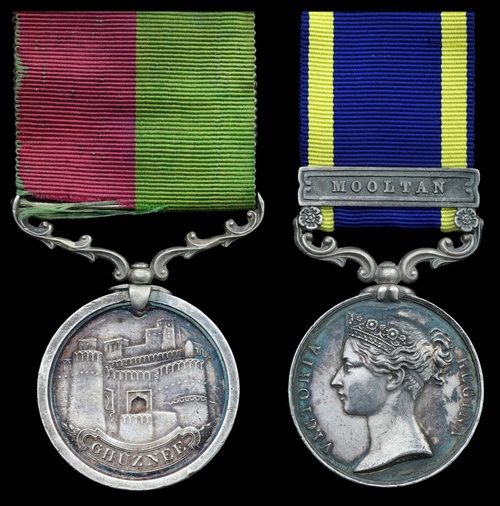
Auction: 22003 - Orders, Decorations and Medals
Lot: 176
(x) The fascinating Indian campaign pair awarded to Major Skeffington Poole, Honourable East India Company's Cavalry, who participated in the sieges of both Ghuznee and Mooltan, at which latter occasion he commanded a Brigade of Cavalry
Ghuznee 1839, unnamed as issued; Punjab 1848-49, 1 clasp, Mooltan (Major Skeffington Poole, Comg. Cavy. Brigade.), first with replacement silver floreate suspension, one or two bruises, very fine (2)
Skeffington Poole was born on 23 May 1803, son of Charles and Henrietta Octavia of Middlesex; after an education under the Reverend Proctor in Stanmore and one William Wilcox of St. John's College Oxford, at the age of 17 he was nominated for a Cadetship with the Honourable East India Company's forces, and consequently commissioned into the Bombay Cavalry. Slowly but steadily climbing the promotion ladder he commanded the Third Company, 1st Bombay Light Cavalry at Ghuznee - for which the regiment received the battle honour 'Ghuznee 1839' and Poole is noted on the Roll of officers entitled to Prize Money for the siege, receiving a captain's share of 330 Rupees 10 Annas.
Likely heading home on well-earned furlough shortly afterwards, on 2 June 1840 he married Isabella Hume and they later went on to have four children. Returning to India, Poole was back with the cavalry in time for the Second Anglo-Sikh War (1848-49) and was present at the Siege of Mooltan (Multan) as part of the army commanded by Sir William Whish (Medals sold in these Rooms, 2018); Poole commanded a Brigade of cavalry and, though a siege is primarily work for infantry and artillery, he and his men no doubt participated as fully as possible in the action which led to the storming and fall of that place on 22 January 1849 - indeed, a squadron of the 1st Bombay Lancers (commanded by a Captain Curtis) were part of Brigadier Capon's Left-Centre Column for the assault.
Poole appears to have retired and returned home a year later, in 1850 - though he maintained a close association with India: in 1858 he corresponded with none other than the famous Charles Darwin regarding the inheritance of colour and characteristics of the Kathiawari horse, and in 1858-59 was called as a witness for the Inquiry into the Organisation of the Indian Army, which was chaired by H.R.H. the Duke of Cambridge - other witnesses included such renowned military figures as Sir George Pollock, Sir Willoughby Cotton and Sir Archdale Wilson. Poole's evidence, running over some four pages of questions and answers, makes fascinating reading. Colonel Poole died on 29 August 1876 and was interred at St. Peter's Church, Chertsey, Surrey. For the Medal of Skeffington Lutwidge - likely a relation - see Lot 13.
For further reading the following sources are recommended:
https://www.limerick.ie/sites/default/files/media/documents/2019-05/Ghuznee%20Prize%20Money.pdf.
https://www.darwinproject.ac.uk/search?keyword=skeffington+poole&tab=
Parliamentary Papers, Vol. 5: Report of the Commissioners Appointed to Inquire into the Organization of the Indian Army; together with the Minutes of Evidence and Appendix, 1859
Subject to 5% tax on Hammer Price in addition to 20% VAT on Buyer’s Premium.
Sold for
£1,400
Starting price
£1200




